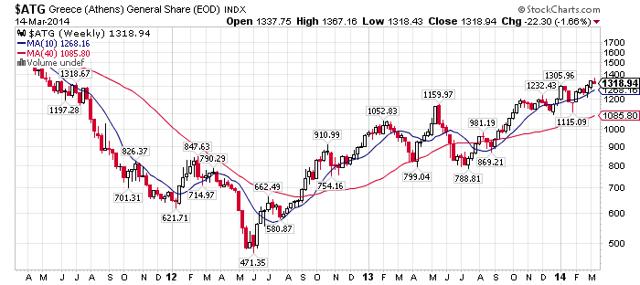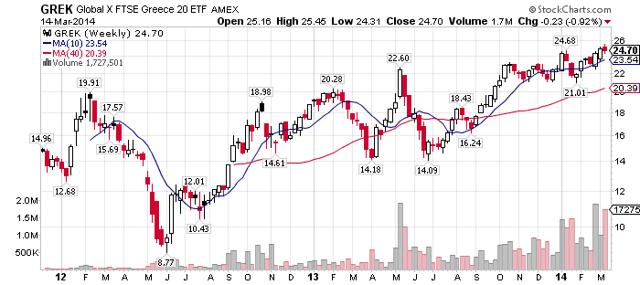"Greece's stock market has likewise posted impressive gains since the June 5, 2012 lows. As shown in the chart below, the Athens stock exchange has rebounded from a low of 471.25 in June 2012 to 1318.94 recently. That represents a 180% gain and an average annualized return of 78.7%. By comparison, the Dow Jones Europe Index is up 55.7% over that same time period, good for an annualized return of 28.4%".
"If history is a guide, then the Greek market still has superior upside potential. The Athens stock index fell 91% from its November 2007 peak to its June 2012 low. It has since rebounded (as noted above) by 180%, but is still 75% below the November 2007 peak".
"Greece's stock market also looks quite cheap on valuation. According to the FT, Greece is the cheapest of all of the country equity markets on a P/E basis. The average P/E for Greece is only 3.0, whereas the average for all countries covered by the FT is 16.0. We have not conducted an analysis to determine whether any one-time or unusual circumstances account for Greece's exceptionally low P/E. One factor is undoubtedly the low 0.5% dividend yield on Greek stocks, well below the global average of 3.0%. Eurobank Research also noted in a December 2013 outlook report that low valuations on bank stocks have been a major drag on the overall stock market. As long as Greece's economic recovery remains on course, its stock market should have more rebound potential.
From a technical perspective, after such significant gains, the Athens stock index is due for a correction. From the longer-term charts, it looks like the Athex could run into resistance from 1400 to 1600, which was its trading range from June 2010 to April 2011. The low end of that range is just 6% above Friday's (3/14) closing level. Concerns about negotiations with the troika and potentially a shift in political power toward the left might be catalysts for a correction.
The Global X FTSE Greece ETF (GREK) is one of the few ways for U.S. investors to invest directly in Greece. GREK has roughly matched the performance of the Athens stock index, with a gain of 181.6% off of the June 2012 low and an annualized return of 79.4% over that period.
Summary. Greece has made good progress since entering its bailout program, but it lags behind on many import reforms and now faces the more difficult task of trying to make its economy grow. As noted by Mr. Provopoulos, the government's agenda is full. Greece must reorganize its civil service operations to root out waste and inefficiency. It must modernize key ministries, like education, health care and justice. It must take further steps to improve the competitiveness of key business sectors, including rolling back rules that unfairly protect certain professions. It must also overhaul the tax system and strengthen enforcement mechanisms.
This will not be easy. But it looks like Greece has made it through the worst part of its economic downturn, so its citizens should be able to get a second wind and ward off austerity fatigue. While there undoubtedly will and should be give-and-take in the ongoing negotiations with the troika, Greece must remain steadfast in following through on its reform initiatives, because doing so will provide the best foundation for a sustainable economic recovery.
Editor's Note: This article covers a stock trading at less than $1 per share and/or with less than a $100 million market cap. Please be aware of the risks associated with these stocks".
Source: Seeking Alpha
Beware. This is not an advice to invest on Greek stocks.
Each individual should do its homework, and should approach these information according to their own profile of risk.

